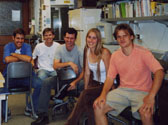
by Malgorzata Wozniacka
For five Brazilian students at the College of Natural Resources studying sustainable agriculture, and for their four Berkeley counterparts in Santa Catarina, Brazil, Fall semester 2003 was spent learning not only about farming, but also about each other's cultures.
The students were part of the US-Brazil exchange program in agroecology funded by the Department of Education-FIPSE and Brazil's CAPES, which brings together a group of students, educators and researchers from the University of California, Berkeley; the University of Nebraska; and two Brazilian Universities, UNICAMP and Universidade Federal de Santa Catarina.
Agroecology is the study of agricultural systems that are productive but also resource conserving. The students in Berkeley and in Brazil audited classes and worked in interdisciplinary teams to study the various social, cultural, economic and environmental aspects of sustainable agriculture.
According to Miguel Altieri, Berkeley professor and program coordinator, the students' focus is on organic agriculture and small farming. This is important, because sustainable agriculture is key for combating rural poverty, enhancing food security, and conserving natural resources. Altieri has been doing research in agroecology since 1981 and will participate in the exchange program again next year.
The exchange program puts an emphasis on practical learning. At Berkeley, the five Brazilian students visited both organic and conventional farmers and concuted research on agroecology as part of the program in order to better understand California agriculture.
All of them admitted to being surprised.
"It's a market-oriented, industrial system of agriculture here," summarized Marcos Alberto Lana, 22. "In Brazil, the most important thing is not only to produce for the market but to also to provide food for your family. It's about food security, while here it's only about profit."
For the Brazilians, who hailed from the south of Brazil which is known for small farms, the most jarring aspect of the big-farm system in the US was its lack of ties to the community.
"The concept of agroecology is not just about not using pesticides. It's also a social issue," said Lana. "People in the U.S. think more about money, so there is big pressure to specialize."
During a visit to a farm in Fresno, the students were surprised that the only crop the farmer grew was cotton. He bought everything else from the store - a practice unheard of in the south of Brazil.
The students hope that the US-Brazil exchange program will help spread small-scale farming, perhaps even in the US.
"Our presence here is important to help people have another view," said one of the students, Marina Baptista, 22. "People in the United States are so used to big farmers. Talking to an American friend and trying to convince him that agroecology can be productive was very hard. By coming here, we can make people aware that small farms can be productive while preserving the environment and rural communities."
While the Brazilians said they found American agriculture "inefficient", because it overlooks social implications, they were also very impressed by the so-called organic revolution.
"People actually care what they eat here," Baptista said. "They are better informed. In Brazil, people are poor and they don't care about their food quality. The ultimate goal is to give everybody access to organic food, not just to the rich people who can afford it."
Meanwhile, four American students each spent a month living at a home-based farm in Brazil. The home-stay is a cornerstone of the agroecology program at the University of Santa Catarina. Students get college credit for writing a report about their experiences.
Paul Roge, 22, lived on a 93-acre farm near Florianopolis. He says he learned part of the family and farm history, as well as the farmer's approach to commercial and home production. The family he stayed with sells dairy and grains to a regional cooperative, and pigs to industry.
"It was a wonderful experience," he wrote from Brazil by e-mail. "I hope to get a sense of what life is like for small-scale family farms in southern countries. I want to understand their dreams and realities, and to find some ecologically mindful examples for what agriculture could be or what it is already."
In addition to the home-stay and to taking classes at the university, Roge and his fellow Berkeley students also took numerous field trips, visiting farms that practice sustainable agriculture, and met with members of "Terra Viva", the Landless Workers Movement.
It is this very movement that the Brazilian students at Berkeley hope to support in the future. Their stay in the US is important, they say, because big farms similar to those in the US are destroying the ecosystem in central Brazil. Also, small farms are put out of business by big ones, and unemployed farmers migrate to cities in search of a better life.
"This exchange program came at the right time," said Diogo Feistauer, 22, one of the Brazilian students. "The new president of Brazil has been pushing projects on agricultural issues. We are hopeful that we can contribute to sustainable farming in the future as experts. There are actually many vacancies for agronomists."
And all of the students learned more than just farming. The Brazilian students lived through their first earthquake, experienced their first Halloween, and fostered some conversations with open-minded Americans. They have also had to battle stereotypes about Brazil, and to convince people that Brazilians are not just about carnivals, soccer, and the Amazon.
